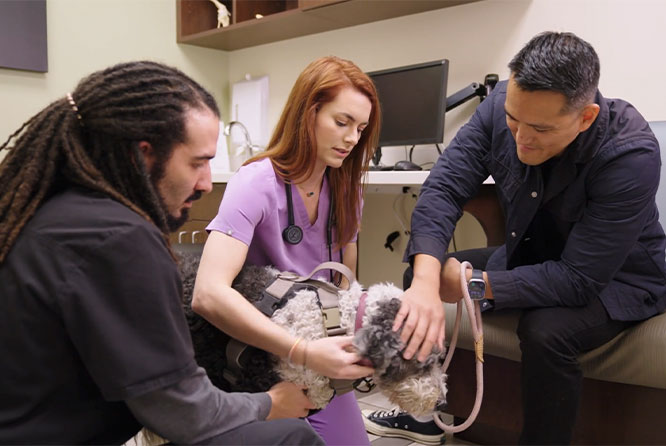Drake’s diarrhea dilemma: A closer ‘hook’ at fecal testing

Case Details and History
Drake, a 3-month-old male golden doodle puppy, originally presented to his veterinary care team in Florida. He was diagnosed with hookworm parasites via a fecal floatation test. He was treated with a benzimidazole deworming medication (fenbendazole) and also prescribed an antibiotic (metronidazole). Shortly after this, his owners moved to North Carolina (NC).
Not long after moving, Drake’s owners brought him to see a veterinarian because he wasn’t eating and was having bloody diarrhea. Drake’s NC veterinary care team noted that he was thin, with signs of weight and muscle mass loss. He was also acting very lethargic and nauseous. During his physical exam, Drake’s intestines were diffusely thickened, and he was very dehydrated. He had two episodes of watery, bloody, and mucous-appearing diarrhea during his exam.
Diagnostic Testing
Drake’s veterinarian was concerned about how sick he was. She recommended diagnostic testing to try and determine the cause of his diarrhea and treat him appropriately. These tests included a complete blood count (CBC) and chemistry profile, a Parvovirus test, and a fecal check with the KeyScreen® Parasite PCR Panel to check for common infectious causes of puppy diarrhea, nausea,
and dehydration.
Drake’s bloodwork results were abnormal and showed signs of inflammation — such as elevated white blood cell and platelet counts on CBC — and elevated globulin proteins on his chemistry. Fortunately, his Parvovirus ELISA fecal test was negative.
Based on these initial results, Drake’s veterinary care team tentatively diagnosed him with progressive and severe gastroenteritis, most likely caused by infection with a heavy burden of gastrointestinal (GI) parasites. Due to the severity of Drake’s illness and his CBC and chemistry findings, emergency hospitalization was advised.
Drake’s owners communicated their concerns about the cost of care, and a spectrum of care plans was developed. He was given IV fluids and supportive medications in the hospital and was sent home with additional supportive medications to manage his diarrhea and nausea. A reassessment exam was scheduled for two days later.
Diagnostic KeyScreen result: Hookworm (Ancylostoma caninum) and Hookworm benzimidazole (fenbendazole, febantel)treatment resistance
Less than 24 hours after Drake’s fecal KeyScreen test was submitted, the results came back to his veterinary care team. The test detected Ancylostoma hookworms, along with the marker for hookworm drug resistance to benzimidazoles, the class of deworming medication that was originally prescribed in Florida to treat his hookworm infection.
At this point, Drake’s veterinarian felt confident that his gastroenteritis was caused by a benzimidazole-resistant hookworm infection — which was why his diarrhea had not responded
to treatment.
Treatment and Management
Drake had not improved while at home and was admitted for hospitalization, which included IV fluid therapy, supportive drugs, and a specific GI puppy diet. Drake’s veterinarian also consulted with a board-certified veterinary parasitologist about his treatment-resistant hookworm infection to get the very best support and advice for his care. The parasitologist made specific and targeted anti-parasite treatment and monitoring recommendations that included a drug treatment protocol effective against resistant hookworms, along with ongoing testing recommendations to ensure his infection responded to treatment.1-3
Drake’s owners were considering possible euthanasia due to how ill he still was. However, his veterinarian discussed with them that, based on the KeyScreen result and parasitologist consult, it was reasonable to begin Drake on a treatment protocol for suspect multidrug resistance hookworm infection. After some time, they could then reassess his condition. His owners decided to give treatment a try, and Drake received his first dose of treatment in the hospital. Once he was discharged, he began receiving medications at home.
Reassessment Visits
Three weeks after being discharged from the hospital, Drake returned for a follow-up appointment. His physical exam showed a dramatic improvement, and all his body systems were clinically normal. His owners reported that his diarrhea had stopped shortly after hospital discharge, and no blood was observed in the stool. He was tolerating his medications with no reported side effects. His owners were very pleased to have him acting like a bouncy doodle puppy again.
At that time, a follow-up fecal sample was submitted for KeyScreen fecal testing. The result came back with a continued detection of hookworm Ancylostoma spp, but the resistance marker was negative. Drake’s veterinarian explained that this result was pretty typical, given that anti-parasite medications are only able to kill hookworms present in the GI tract but not hookworm larvae that are hiding in an arrested development phase (called larval leak) in Drake’s muscle tissues. Therefore, the detected hookworms on the follow-up KeyScreen panel were likely due to the common “larval leakage” phenomenon.
Drake continued on his specific anti-parasite treatment protocol with re-check fecal testing using KeyScree. A third KeyScreen test was run one month later and continued to detect Ancylostoma hookworms with a negative resistance marker. Again, this was likely due to larval leak. Drake’s multidrug anti-parasite treatment protocol continued, and another month later, his 4th KeyScreen test was undetectable for Ancylostoma spp. hookworms. His veterinary care team was thrilled to give Drake and his owner a clean bill of health.
Drake’s case illustrates the unique capability of KeyScreen to accurately and efficiently diagnose GI parasites, like hookworms, in dogs. His veterinarian was able to confidently diagnose drug resistant hookworms as the cause of his diarrhea and illness, target treatment, apply actionable antimicrobial stewardship in his case management, and provide his owners with a prognosis for his response to therapy and return to health. She was also able to discuss zoonotic concerns and provide risk counselling for Drake’s owners, so they felt informed for all members of the family.
KeyScreen Product Information
US CODE
T991
CANADA CODE
CT991
SPECIMEN
0.15 grams fexes
TURNAROUND
24 hours for most customers 48 hours or less for all customers




